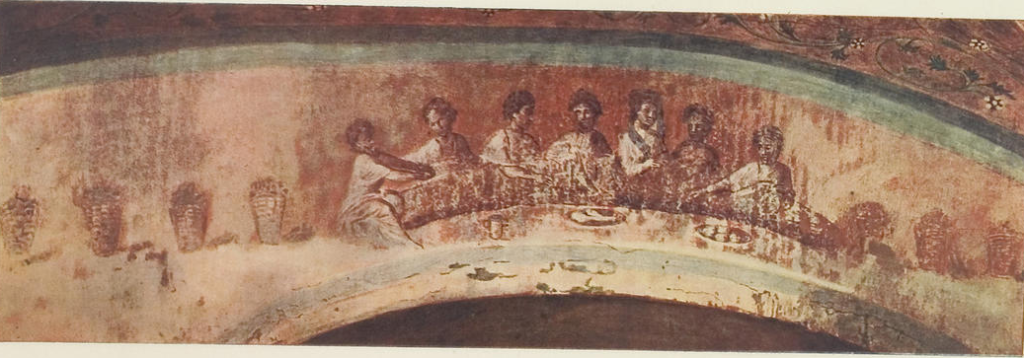[Greek] κλάσμα (klasma), [Latin] fragmenta: fragment, broken piece, remnant, morsel, bit; Mt.14:20, Mt.15:34, Mk.6:43, Mk.8:8,19-20, Lk. 9:17, Jn.6:12-13

Fractio Panis (The Breaking of the Bread): a fresco found in the Catacombs of Priscilla (1st half of the 2nd century) in Rome.
Background information:
Fractio Panis: This scene depicts six participants reclining and one celebrant (at the left) with his arms outstretched breaking bread. He has a small loaf or cake in his hands. Upon the table immediately before him is a two-handed cup. Further along the table are two large plates, one containing two fishes, the other five loaves. In the background are baskets filled with loaves. It is believed that Priscilla (Prisca) belonged to a prominent Roman family. Eventually, Prisca returned back to Rome after the persecution of Jews by the emperor Claudius. The early Christians celebrated the breaking of the bread in their homes and in the catacombs. Churches were later built over these homes and locations of Christian martyrdom.
Greco-Roman culture: This term means fragment, piece, and part. This term is also eclectically found as broken branches, parts of a temple, and abandoned lands (provinces). Xenophon’s Cynegeticus 10,5 states, “The huntsmen also will find many evidences of the quarry, the tracts in soft ground, broken branches where the bushes are thick.” This term also referred to abandoned lands due to invasions, threats, and crop failures. The Marcian Treatise (Roman immunitas) was a freedom given to landowners who recently acquired these abandoned lands. This government provided an exemption from paying taxes to the Roman authorities.
Old Testament: This term refers to a part cut off, cleavage, piece of millstone, piece of cake, fragment, morsel of bread, and meat offering. There was an ancient custom in Palestine of breaking bread with the hands rather than cutting it with a knife. During ordinary family meals, special meals (with guests), the Passover, or the beginning of Sabbath, the head of the house would break bread and distribute the pieces to those who sit at the table with him. Taking the bread, blessing it, and distributing it others becomes the basis for the primitive Christian meal and fellowship.
New Testament: This term primarily refers to pieces or morsels of bread. All scripture makes reference to the multiplication of loaves and the feeding of the 4000 (or 5000) people. Essentially, these fragments or morsels are the broken bread morsels given to others. The breaking of the bread becomes part of the Eucharistic celebration of the Apostles in Acts. 2:42. This communal celebration includes the teaching of the Apostles, the breaking of the bread, and the prayers. On the road to Emmaus, Jesus also took bread, said the blessing, and gave it to the two travelers.
Scripture:
“When they had their fill, He said to them, ‘Gather the fragments left over, so that nothing will be wasted.’” Jn.6:12
They were able to fill twelve wicker baskets with remaining fragments.
Taking the five loaves and the two fish, He said the blessing, broke the loaves, and gave them to the disciples, who in turn, gave them to the crowds.” Mt. 14:20
Conclusion:
Iconoclasm, iconoclast, cataclysm, fragment
I was actually surprised in how this term was unusually used, referencing broken branches and abandoned lands (fragments of territories). Perhaps, this stark difference comes from a strictly secular worldview. It was interesting to note that sometimes the people received a land exemption from the authorities.
The Old Testament culture developed the cultural and cultic ritual of breaking bread in the communal meal. Breaking of the bread becomes a very important institution in Judeo-Christian culture, the Catholic Mass, and general ecumenical fellowship.
It is interesting to note that numbers in scripture have important symbolic meanings. 1000 means everyone. 4000 means everyone in all directions (north, south, east, and west.). 5000 means all Jews (Hebrews) under the Law (which contains five books).
Catholic Mass: The priest, in the person of Christ, calls upon the Holy Spirit to change the bread and wine into the Body and Blood of Christ. The priest also takes the bread, blesses it, and breaks it, to be distributed to the congregation.
An iconoclast is a person who destroys or attacks religious icons. The Greek kata- means down. Therefore, a cataclysm is a disaster (breaking down).
This is all I have in “breaking down” the meaning of this term (into smaller pieces) at various times in history.
